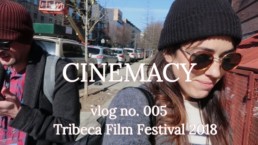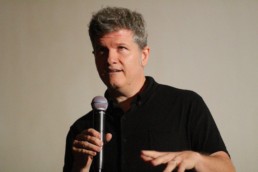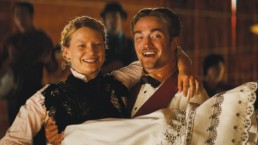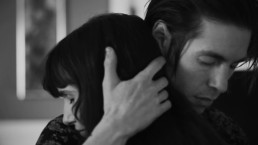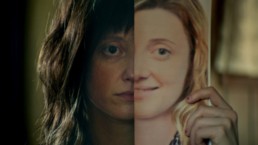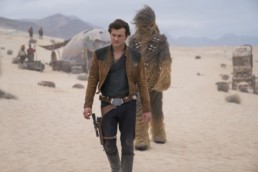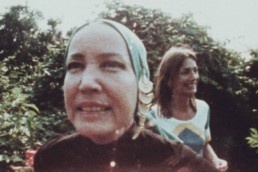'Under the Tree' Review: Icelandic Dark Comedy is Both Hilarious and Horrifying
And who says Icelandics don't have a sense of humor?
Director Hafsteinn Gunnar Sigurðsson challenges that notion by bringing the dark comedy Under the Tree (Undir Trénu) to American audiences this Friday. Selected as the Icelandic entry for Best Foreign Language Film at the 90th Academy Awards, the plotline is quite simple, but oh how quickly everything gets turned on its head. What starts out as a small dispute between next-door neighbors
A tree is often regarded as symbolizing family, ancestry, and even a form of rebirth, but that is far from the case in this dark comedy – set on a quiet street in a suburb of Reykjavik, Iceland. Here, a single tree is at the center of what turns out to be some of the most vulgar and unnecessary violence between two neighbors. Inga (Edda Björgvinsdóttir) and Baldvin (Sigurður Sigurjónsson) are a sharp, older couple whose large tree in their backyard casts a shadow onto their neighbor's, Konrad (Þorsteinn Bachmann) and Eybjorg (Selma Björnsdóttir), sun deck. After numerous requests to cut down the tree are ignored, passive-aggressive pranks on each other start occurring, like the slashing of car tires and stealing garden gnomes. This back and forth bickering escalates drastically as blood, sweat, and tears are soon shed in the attempt to out-do each other, with the expectation that the "winner" will get to decide the fate of the problematic tree.
As if the stress of the quarrel wasn't enough, Inga and Baldvin's son, Atli (Steinþór Hróar Steinþórsson), has recently moved back into their home after his wife Agnes (Lára Jóhanna Jónsdóttir) accuses him of adultery. Dealing with the aftermath of a dissolving marriage and fighting for custody of his four-year-old daughter, Atli finds himself wrapped up in the tree debacle as well.
What is so darkly comedic about 'Under the Tree' is the question of how such a mundane and minor dispute becomes so blown out of proportion.
What is so darkly comedic about Under the Tree is the question of how such a mundane and minor dispute becomes so blown out of proportion. The methods used by each party involved are responses that only seem capable of happening in dreams, or in this case, nightmares. However, the fact that Iceland doesn't get a lot of sun creates an understandable reaction to any hindrance to that precious light, and doing so could very well constitute breaking out the chainsaws and guns.
Each person in front of the camera does a fantastic job of building suspension with every frantic phone call, rash decision, and emotionally unstable reaction. Edda Björgvinsdóttir steals the show as Inga, the feisty older woman who proves she is willing to do whatever it takes to not only succeed but make sure her opponent fails. It's a competitive quality that most people have buried somewhere within themselves but would never think of acting on to this degree.
Behind the lens, the visual style of Under the Sun highlights the country's beauty and tranquility as it projects Iceland with a naturalistic and softened aesthetic. Director Hafsteinn Gunnar Sigurðsson and cinematographer Monika Lenczewska notably pull design inspiration from famed directors including Joachim Trier, Ruben Östlund, David Lynch, Lynne Ramsay, and Derek Cianfrance, to name a few. The film's score is another wonderful surprise for the senses. Composer Daniel Bjarnason beautifully moves the film along its journey, with each high and low point accompanied by the subtle notes that Icelandic music is known for.
With tonal similarities to Greek director Yorgos Lanthimos' work, specifically, The Killing of a Sacred Deer, Under the Tree is a refreshing film by a young visionary. It is fantastical and darkly frightening, leaving audiences uneasy about whether to laugh or be horrified at the situation unfolding in front of them. And while this was most likely not the film's intention, Under the Tree also serves as an oddly cautionary tale about thinking twice before choosing who, and how, to confront someone over seemingly trivial matters.
'Under the Tree' is not rated. 89 minutes. Opening this Friday at Laemmle's Royal Theatre.
vlog no.005 | Tribeca Film Festival
A behind-the-scenes look at the 2018 Tribeca Film Festival.
On Camera: Morgan Rojas
Editing by: Morgan Rojas
Camera Assistance: Flynn Mitchell
Special Thanks to Cory Madsen for letting us stay at your beautiful Brooklyn apartment.
♫Music By♫
Joakim Karud - No Worries (feat. Dyalla)
Song - https://youtu.be/4E6Erhc0UaY
Dyalla - http://smarturl.it/Dyalla
Boost Song - https://youtu.be/cvOvQloDp14
Follow Joakim Karud - http://smarturl.it/joakimkarud
'The Icarus Line Must Die' Director and the Harsh Reality of the LA Indie Music Scene
One look at director Michael Grodner's Vimeo page and it's clear that he has his finger on the pulse of the indie rock music scene.
A seasoned music video director whose work has been featured on MTV and various festivals around the world, Grodner expands his repertoire with his debut feature film The Icarus Line Must Die. During our exclusive interview, we talk about teaming up with Icarus Line frontman Joe Cardamone, and how he created a surreal and boundary-pushing art film that not only acts as a portal into the mind of a struggling LA artist but also a fascinating tour of under-the-radar hotspots in East LA. We begin:
The Icarus Line Must Die is so strong and precise in its art-house, black & white aesthetic. Did you have a visual style or certain imagery in mind that you were looking to reproduce in the film?
The Icarus Line Must Die was inspired by the No Wave films of the late seventies/early eighties -- films like Jim Jarmusch's Stranger Than Paradise, Amos Poe's The Foreigner and Uli Lommel's Blank Generation are a few films that were born out of this movement. Stranger Than Paradise & The Foreigner were both shot in black and white (Blank Generation wasn't) -- so it was definitely an aesthetic that we dug. There's also a grittiness, moodiness and a timeless quality to the look that we were also trying to achieve and that we felt fit the storyline and characters as well.
What have people asked you about the most after seeing the film?
People ask how much of this film is true to life and the answer is: a lot.

Courtesy of Dark Star Pictures.
The film played at the Highland Park IFF last year. Was that a special experience, given that the majority of the film takes place in East LA (specifically Highland Park)?
It was especially fitting to screen the film at the Highland Park IFF - in the Highland Park Theater -- the iconic sign above the theater is even featured in the movie. So there was definitely a surreal quality to it all -- seeing the theater in the movie while you're sitting in the theater that's in the movie.
Can you talk about the writing process with the Icarus Line frontman and star of the film, Joe Cardamone?
Joe and I talked over the phone a lot (and Travis Keller helped out, too). Joe relayed the experiences he had as a member of the Icarus Line to me -- and then I crafted a detailed outline from those experiences and stories, which we then shared with each other and refined -- until we were ready to start shooting. We relied on the performers to improvise their dialogue as we weren't working from a traditional script.
Joe Cardamone and Michael Grodner. Courtesy of Rock NYC.
Professionally, what’s the biggest risk you’ve taken that you feel has paid off?
Just going for it and making a film on my own and hoping against hope that I've made one that more than just a few people want to see.
Why should audiences seek out this indie film on its VOD release day on July 10th?
It's a film about the underground music scene in LA -- so if you're a fan of the music and especially if you're a fan of the Icarus Line, then you're definitely going to want to seek out this movie. But I think the film has a greater reach because it's a film about an artist and the struggle he goes through to do what he loves, remain true to himself yet still be able to put food on the table. I think a lot of people can relate to that. Plus it gives you a window into a world that you might not have seen before.
'Damsel' Review: Robert Pattinson is a Quirky Cowboy in This Western Spoof
This review originally ran on January 29th, 2018, during the Sundance Film Festival
Fresh off the heels of starring in the Safdie brothers' stylish crime drama Good Time, Robert Pattinson finds himself working with another set of director brothers to show off his more comedic side in this wacky western, Damsel.
Trading kooky for cool, Pattinson plays a man desperate to be reacquainted with his one true love, despite the physical – and, as we find out, emotional – distances between them. David and Nathan Zellner, collectively called the Zellner Brothers, bring this light-hearted send-up to the Sundance Film Festival.
Samuel Alabaster (Pattinson) is a man on a mission. With an engagement ring in one hand and a miniature horse on a leash in the other, he's traveled to a small dusty Western town to enlist the help of Parson Henry (David Zellner), the local pastor and town drunk. While the exact details of the journey remain unclear (or may not yet be fully revealed), Parson is not one to turn down money and agrees to follow Samuel on his mission for monetary compensation. After traveling for days on horseback, which includes an unexpected shootout with natives in the middle of the woods, Samuel finally explains to Parson that he is en route to rescue his fiancé Penelope (Mia Wasikowska) from her evil kidnapper, and afterward marry her, and live happily ever after with her. His feelings of love are expressed more fully in the acoustic lullaby that is one of the film's funnier moments. The only problem is, once the duo reaches Penelope, it turns out not everyone is on the same page (Penelope mainly) and from here it’s a comedy of errors as Parson tries to piece everything together on his own as things unfold very quickly. No one is safe, no one is certain of what is going on, and no one wants to be where they are.
'Damsel' has the structure of a good comedy – its deadpan delivery evokes the humor of Wes Anderson, and its silliness is one whiskey shot away from being another '¡Three Amigos!' or 'A Million Ways to Die in the West.'
Damsel has the structure of a good comedy – its deadpan delivery evokes the humor of Wes Anderson, and its silliness is one whiskey shot away from being another ¡Three Amigos! or A Million Ways to Die in the West. From the opening sequences, the film shows promise, and Pattinson and Wasikowska's opening jig number had me laughing the hardest out of any movie moment at Sundance. However, Damsel's biggest flaw is that it feels awkwardly split into two very distinct acts: the first being Samuel’s journey up the mountain to find Penelope, and the second being Penelope’s journey back down the mountain to independence, with little-shared overlap in the middle. We initially become so invested in Samuel’s story (who himself is a delightful character) that when the focus and story shifts to Penelope (who unfortunately isn't as cartoonish a character as Samuel, resigned to only swat away every male's advances like flies), it's something of a disappointing end.
Unbalanced story pacing tends to happen in films when the directors are also its actors (Nathan Zellner plays Penelope’s coonskin-cap wearing brother-in-law, Rufus), and Damsel only suffers from this symptom mildly. While there is no denying that Damsel is in a league of its own and that the Zellner brothers have effectively combined modern deadpan comedy with old western tropes to transcend time periods (and the film guarantees laughs every time Butterscotch the miniature horse is seen on screen), the story itself could benefit from a further tightening of scenes and editing of dialogue so that the jokes remain punchy and the story moves one tumbleweed quicker than what's here. While it’s clear that Penelope may not need help finding her way out of a messy situation, unfortunately, this Damsel could use just a little more saving.
113 minutes. ‘Damsel’ is rated R for some violence, language, sexual material, and brief graphic nudity. Opening this Friday at the Nuart Theatre.
'The Icarus Line Must Die' Review: The Struggle is Real in This Punk Rock Biopic
They were once regarded as “the greatest rock group of the 21st century”.
One of the dominating forces in the mid-2000's music scene was Los Angeles based, post-hardcore band, The Icarus Line, whose provocative stage presence and divisive music was so different from that of other popular bands at the time. However, the volatility and ever-changing music industry eventually affected The Icarus Line, hard. In 2015, eight albums later, the band split up and left frontman Joe Cardamone broke, confused and feeling lost. Director Michael Grodner's debut film The Icarus Line Must Die is a gritty punk rock biopic that explores this tumultuous time in Cardamone's life.
When he was at the top of his game, Joe Cardamone was regarded as the man, the myth, and the legend. His band, The Icarus Line, appealed to the punks and weirdos of the music scene. The Icarus Line was akin to metaphorical gasoline violently thrown on the fire that was rock music at the time, but this is not when we meet Joe. The story begins at the point in his life when band members are quitting and record labels are ignoring his latest work- forcing Cardamone to work in a recording studio for extra income. He also begins receiving mysterious death threats from blocked numbers on his cell phone.
While there isn't much of a solid plot in the film, The Icarus Line Must Die acts more like a character study of Joe Cardamone as he deals with these situations. It portrays his humbleness when asking for help from peers and record labels, his desperation when selling instruments for extra cash, and his attempt to protect his wife from a possible, unexpected deadly attack. Cameos from fellow LA grunge rocker Ariel Pink, Pearl Charles, and Cardamone's wife, Charlotte, round out this limited cast.
Locals will love that we are taken on a tour of East LA throughout the film... 'The Icarus Line Must Die' also acts as a cinematic map of cool spots you definitely want to check out.
Locals will love that we are taken on a tour of East LA throughout the film; from Permanent Records on York Blvd. in Highland Park, to TAIX on Sunset Blvd. in Echo Park, The Icarus Line Must Die also acts as a cinematic map of cool spots you definitely want to check out.
The Icarus Line Must Die, much like the band itself, strays from expectations. Part dramatic narrative, part art film, the various experimental techniques displayed here are best seen and approached by the open-minded. It is shot completely in black and white, an edgy look that perfectly fits the band's image. Aside from incorporating original Icarus Line songs, the music composition unexpectedly plays like a western. Both moody and tangy, and the audio is a vital part of propelling the story forward by setting the tone of uncomfortable situations and inconsistency.
One line in the film really stands out: "Be truly loved or truly hated, anything in the middle is garbage." Like music, the same can be said about films. The Icarus Line Must Die may very easily fall into either of these two polarizing categories– fans of the band or music lovers, in general, will no doubt be fascinated with this glimpse into Cardamone's personal life, and how that translates into his larger-than-life stage presence. Those who are not open to unconventional filmmaking (and subpar acting) may want to sit this one out or may run the risk of a frustrating watch. The Icarus Line Must Die is not out to win any Academy Awards or achievements in filmmaking, but what we do have here is a passion project from a passionate person and Joe Cardamone's creative outlet is definitely for our enjoyment.
'The Icarus Line Must Die' is not rated. 83 minutes. Opening this Friday at the Laemmle Royal Theatre.
'Nancy' Review: A Manic Pixie Poster Child for Mental Health
A24's Hereditary is getting a majority of the "must-see", "edge-of-your-seat" buzz this week (and rightfully so), but there is another psychological thriller that may be less publicized but is just as powerful.
Director Christina Choe's Nancy is an intimate look at one woman's desire for human connection and the lengths she is willing to go in order to find or fabricate it. Winner of the Waldo Salt Screenwriting Award and Grand Jury Prize nominee at this year's Sundance Film Festival, Nancy opens today at the Nuart Theatre.
Andrea Riseborough stars as the titular Nancy, a thirty-something-year-old
Nancy calls Betty with the news and after the initial shock wears off, Betty invites Nancy to their home. Betty, the naive optimist, quickly falls in love with Nancy and the notion that her prodigal daughter has finally returned. Leo, on the other hand, is more wary and keeps Nancy at an arm's length in the beginning. The more time the couple spends with Nancy and vice versa, the more everyone believes in this seemingly impossible happy ending. However, Nancy's past behavior is questionable; can we really trust that she is the person she thinks she is? Or is this just another false character and elaborate lie?
Choe has successfully created a strong and multi-dimensional female character.
Nancy is writer and director Christina Choe's first feature film and her debut is a stunning one. Riding that fine line between unsettling and sympathetic, Choe has successfully created a strong and multi-dimensional female character. These types of storylines– where our protagonist is as unpredictable as the wind– are fascinating to watch play out on screen. This convincing story would not have been possible without Riseborough's fantastic portrayal of this complex woman as she transforms into a manic pixie poster child for mental health. Buscemi and Dowd contribute their talents to round out this small yet energized cast, giving powerful performances as heartbroken parents who believe in a miracle.
Nancy is a slow burn thriller that takes its time to build up the environment and desperation of the characters. It has the ability to make the audience feel physically uncomfortable through the stuffiness of Nancy's mother’s home, as well as translate the emotional rollercoaster Betty experiences in Nancy's initial phone call. While it may not make you jump out of your seat in terror, Nancy will send chills down your spine in its own cold and calculating way.
'Nancy' is not rated. 87 minutes. Now playing at the Nuart Theatre in Los Angeles.
'Solo: A Star Wars Story' Review: An Uninventive Telling of Everyone's Favorite Smuggler
While the Star Wars saga continues to propel the story in a new direction, the Star Wars universe is committed to exploring every corner of the galaxy far, far away.
Solo: A Star Wars Story, in theaters everywhere today, acts as a prequel to the original Star Wars by telling the origin story of everyone's favorite smuggler, Han Solo. As originated by Harrison Ford in the first Star Wars, he would play Han for the rest of the series, cementing his status as one of pop culture's most iconic characters. In Solo, Alden Ehrenreich steps up to the plate to channel the smuggler as a twenty-something-year-old street rat turned fighter pilot. While it's not terrible, Solo is uninventive and limp, which fans may be disappointed– but not shocked– to hear.
We are immediately thrust into following the titular Han (Ehrenreich), a smuggler escaping a life of "lawlessness" along with beautiful Qi'ra (Emilia Clarke). Fed up with their dreary life on the planet Corellia, Han makes a plan to escape with Qi'ra and live out his dream as a fighter pilot. Their attempt to leave ends up in chaos, Han narrowly escapes but is forced to leave Qi'ra behind. Determined to save her from an unknowing fate, Han continues on his journey alone (or, solo), desperate to find a way to rescue her from the evil powers that be.
His quest to rescue Qi'ra is not an easy one. In fact, Han nearly gets killed multiple times (but- no spoiler here- of course, he doesn't). He meets a cast of characters throughout his journey, including the killer wookie turned best friend, Chewbacca (Joonas Suotamo), and fellow back-alley smugglers, Tobias Beckett (Woody Harrelson) and Val (Thandie Newton). Han becomes entangled in the duo's latest mission, to rob a train full of coaxium fuel for the criminal organization Crimson Dawn, which will bring everyone involved a major payday. Han sees the reward money as the opportunity he needs to buy a plane to finally rescue Qi'ra and wholeheartedly agrees to join. However, things go south before the mission is completed, which forces the group to take on an even riskier job. This new job introduces Han to Lando Calrissian (Donald Glover), L3-37 (Phoebe Waller-Bridge), and ultimately, the evil forces of Crimson Dawn leader, Dryden Vos (Paul Bettany).
Although for as much criticism as the film has received, there really is nothing like sitting in a theatre listening to John Williams' Star Wars theme song in surround sound. That alone may be worth the price of admission.
While it's a serviceable movie, there's no denying that we're cashing in on the currency of a character and world we already know rather than building things anew. There is only so much originality that can go into "prequel" films like this one, and unfortunately, that predictability is Solo's biggest downfall. While there are a few plot twists and surprises here and there, Solo as a whole comes off as flat. Action scenes aside, the story lacks the pizzazz that Star Wars fans have come to expect and deserve.
It's only been a year since the latest Star Wars movie, The Last Jedi, was released which poses the question– is the frequency which Disney is pumping out these films making them less special? That could be one reason why Solo feels unnecessary in relation to the Star Wars canon. That's not to say that the film lacks talent, both in front of and behind the camera, including director Ron Howard (who replaced directors Phil Lord and Christopher Miller after they were let go because of bumpy behind-the-scenes drama). Ultimately, Solo's biggest disappointment is that it is forgettable, especially among the sea of other hero movies that came out recently. Although for as much criticism as the film has received, there really is nothing like sitting in a theatre listening to John Williams' Star Wars theme song in surround sound. That alone may be worth the price of admission.
Solo: A Star Wars Story is rated PG-13 for sequences of sci-fi action/violence. 135 minutes. Now playing in theaters everywhere.
https://www.youtube.com/watch?v=jPEYpryMp2s
'That Summer' Review: Never-Before-Seen Footage Revealed in 'Grey Gardens' Prequel
If you're familiar with the documentary Grey Gardens, you're probably aware that it is arguably one of the most iconic American documentaries in cinema's history.
The story of an eccentric mother and daughter- Big and Little Edie Beale- who removed themselves from high society living to live together in an unusual yet loving codependent relationship, would eventually become the subject of the documentary Grey Gardens. The film's cult following in its devoted fan base would soon spark TV movies, numerous parodies, and perfect Halloween costumes. This Friday, fans of Grey Gardens can go behind the scenes of the East Hampton estate where they lived in never before seen footage, which includes appearances by Andy Warhol, Truman Capote, and Mick Jagger in the film, That Summer.
The film opens slowly. Using entirely archival footage, we spend the first five minutes with photographer Peter Beard as he recounts stories while flipping through the pages of his photo book, the most interesting being anecdotes of hanging out with Warhol and Jagger during the Studio 54 era. Through all of the glitz and glamour that Beard had photographed over the years, we find that- for all of their peculiarities- there was no subject quite like the Beales. Beard, along with his friend Lee Radziwill (a cousin of Edith and Edie Beale) would decide to chronicle the moments of their odd living at the place where they lived, the crumbling Grey Gardens estate, during one summer in 1972. The initial purpose of the film was to show how the East Hampton economy had changed over the years, and the run-down decrepit mansion was the perfect location.
...a fascinating collection of hilariously observed moments.
However, after spending the summer with Radziwill and the Beales, the project was ultimately shelved. A few years later directing duo Albert and David Maysles went back to visit Edith and Edie, and the outcome of their visit resulted in the iconic and infamous documentary, Grey Gardens. 45 years later, the original footage of Beard's summer with the Beales (close to four rolls) went on to become That Summer.
That Summer is a small, quiet documentary that should excite fans of the Beales. Between Big Edie singing opera in her oversized armchair, to Little Edie claiming that her cat with an eye disorder is the spitting image of Teddy Kennedy, the film is a fascinating collection of hilariously observed moments. With a runtime of 80 minutes, That Summer may confuse or be slightly off-putting to those who aren't already used to the nonsensical style of Grey Gardens or are expecting a documentary with a clear story with plot points, arc, or direction. However, fans will be thrilled with the access to this never before seen footage that amplifies the eccentricity of the Beale women (who were also cousins of Jackie O.).
Did we really need another documentary about the wildly wonderful Beales? Proving that there is never too much of a good thing, director Göran Olsson (The Black Power Mixtape 1967-1975) creates the perfect prequel to Grey Gardens with this documentary. Both Beales have since passed but their memory will continue to live on in this iconic footage.
'That Summer' is not rated. 8 0minutes. Opening in select theaters this Friday.


